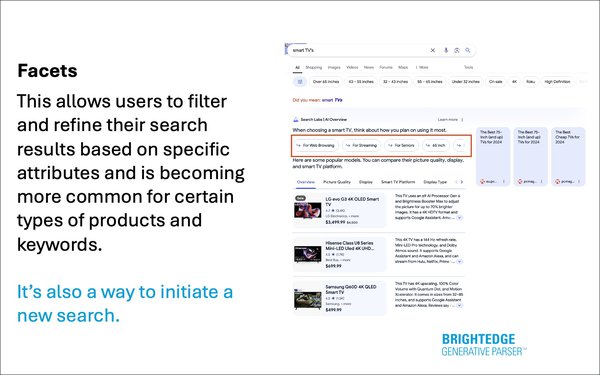
BrightEdge Generative Parser has detected a new set of patterns and key trends as part of its monthly monitoring of Google AI Overviews (AIOs).
Google’s focus in July seems to lean
toward education and ecommerce, perhaps because back-to-school sales have begun rolling out. The National Retail Federation (NRF) annual survey reports that about 55% of consumers began back-to-school
and college shopping in July.
Some 57% of consumers are shopping online for back-to-school merchandise, with 50% shopping in department stores, 47% in discount stores, 42% in clothing stores,
and 23% at stores with electronics, according to the NRF.
Jim Yu, founder and executive chairman of BrightEdge, says July parser data shows more vertical sector data in AIO.
As the
holiday season approaches, “Google has been improving AIO results industry by industry, overall increasing by 8% in July” within search results -- peaking at 12% before declining to less
than 8% by the end of the month, Yu said.
advertisement
advertisement
Back-to-school ecommerce sales in 2024 are expected to reach $28.34 billion -- up 1.4% from the previous year, according to Emarketer.
Ecommerce information found in AIO remained stable at 17% of the queries for most of July, despite significant daily fluctuations.
Some 40% of ecommerce queries include statements such as
“When choosing” or “you can consider.” Some form of direction seems to follow these statements. For example, “When choosing a front load washer, you can consider things
like capacity, energy efficiency, and noise level.”
Broad product categories, brand specific and basic how-to queries, and product features experienced a decline in AIO results in
search.
Many AIO results were related to queries for education degrees. For queries such as “computer science degree” and “online history degree,” AIOs rose from 13% in
June to 53% in July.
Queries related to human resources and salary soared from 7% to 85% during the second half of July. Demonstrating that AIO drives traffic to websites, this surge in
education-based queries boosted citations for ziprecruiter.com and bestcolleges.com, placing them among the top 10 domains for this industry.
Google has integrated advanced features into AIO
around user-specific queries and those that require actionable information.
This month the parser detected a focus on "When" statements -- mostly to navigate complex topics, particularly in
decision-making processes, Yu said -- calling them “facets,” which are common with “when” statements and present in about 21% of queries.
“AIO is increasingly
focusing on long-tail, specific queries rather than broad, general searches,” he said. “The integration of facets represents a significant advancement because this feature allows users to
filter and refine search results based on specific attributes. It mirrors the functions found in advanced e-commerce platforms.”
Facets are likely to appear in complex technology
queries, products with multiple specifications or options like the purchase of a mattress or home security system. They also are common when the search term includes particular product types, sizes,
or technological features.
Many products related to home improvement, kitchen essentials, and personal comfort seem to warrant faceted navigation in AIO, as well as items that consumers
typically compare across multiple features such as washing machines or coffeemakers.